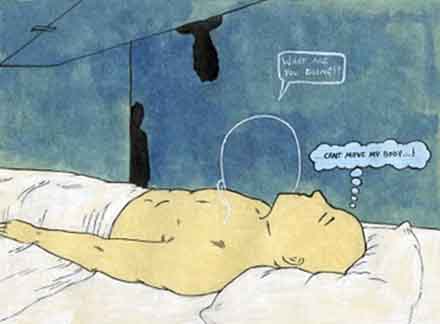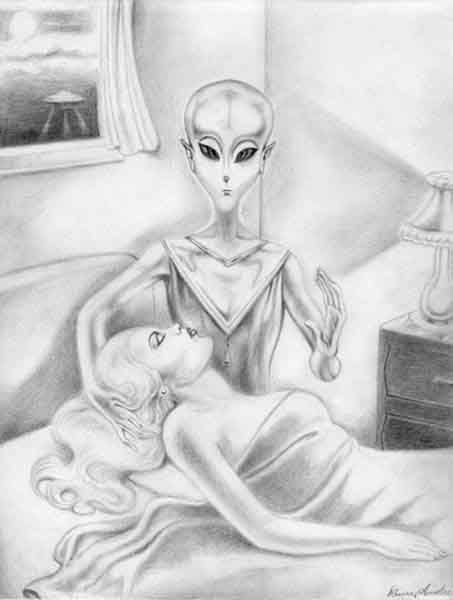

Sleep Paralysis can have a physical or emotional base depending on the situation, and always links with the emotion "fear". To be paralyzed is to be in fear. To live in fear based on events in one's life is to create panic, anxiety, and paralysis where the person feels they have no where to go and things are closing in.
Have you ever woken up, unable to move, paralyzed by fear? There can be any number of reasons people suddenly awaken from sleep and feel physically paralyzed - but it all goes to fear - usually about something in your physical reality that you have no control over after which you carry that emotion into your dream time and back to physical reality.
There are many causes of sleep paralysis, physical and also not-so-physical, such as being awakened suddenly when your consciousness has not fully integrated back into your physical body. This often results in physical symptoms of nausea and disorientation - by coming back into the body too quickly. Remember that only part of our experience is in 3D Earth physical reality grid. There is so much more, interesting experiences simultaneously occurring in other grids realities (subroutines of the program.) You are much more than the person sitting in that chair reading this.
Sleep paralysis for some goes to involuntary (and often scary) unexpected floating out of the physical body for any number of Out of Body experiences, usually astral projection.
Sleep paralysis is a condition characterized by temporary paralysis of the body shortly after waking up (known as hypnopompic paralysis) or, less often, shortly before falling asleep (known as hypnagogic paralysis).
Physiologically, it is closely related to the paralysis that occurs as a natural part of REM (rapid eye movement) sleep, which is known as REM atonia. Sleep paralysis occurs when the brain awakes from a REM state, but the bodily paralysis persists. This leaves the person fully aware, but unable to move. In addition, the state may be accompanied by hypnagogic hallucinations.
More often than not, sleep paralysis is believed by the person affected by it to be no more than a dream. This explains many dream recountings which describe the person lying frozen and unable to move. The hallucinatory element to sleep paralysis makes it even more likely that someone will interpret the experience as a dream, since completely fanciful objects may appear in the room alongside one's normal vision.
The primary symptom of sleep paralysis is partial or complete skeletal muscle paralysis during the hypnopompic or hypnagogic states. In other words, it is the sense of being aware that one is unable to move or speak while falling asleep or waking up. Sleep paralysis may also be accompanied by hypnagogic hallucinations. These hallucinations can be auditory, tactile, and/or visual. If a polysomnograph is taken, at least one of the following will be shown: skeletal muscle tone suppression, REM sleep at sleep onset, or dissociated REM sleep. The paralysis can persist anywhere from a few seconds to a few minutes before the person is able to either return to REM sleep or to become fully awake.
Sleep paralysis occurs during REM sleep in order to prevent the body from manifesting movements made in the subject's dreams. Very little is known about the physiology of sleep paralysis. However, some have suggested that it may be linked to post-synaptic inhibition of motor neurons in the pons region of the brain. In particular, low levels of melatonin may stop the depolarization current in the nerves, which prevents the stimulation of the muscles, to prevent the body from enacting the dreamt activity (e.g. preventing a sleeper from flailing his legs when dreaming about running).
Many people who commonly enter sleep paralysis also suffer from narcolepsy. However, various studies suggest that many or most people will experience sleep paralysis at least once or twice in their lives. Some reports read that various factors increase the likelihood of both paralysis and hallucinations. These include:
Sleeping in a supine position (facing upwards)
Irregular sleeping schedules; naps, sleeping in, sleep deprivation
Increased stress
Sudden environmental/lifestyle changes
A lucid dream that immediately precedes the episode. Also conscious induction of sleep paralysis is a common technique to enter a state of lucid dreams, also known as WILD .
Artificial sleeping aids, ADD medications and/or antihistamines
During paralysis episodes, patients may be advised to try moving the facial muscles and moving eyes from one side to the other. This may hasten the termination of the attack. Clonazepam is highly effective in the treatment of sleep paralysis. The initial dose is 0.5 mg at bedtime, while an increase to 1 mg per night might be necessary to maintain potency. Anecdotal reports indicate SSRIs such as fluoxetine markedly decrease the incidence of sleep paralysis. Several people who have been both on and off SSRIs have reported corresponding decreases and increases in sleep paralysis episodes. Others report no effects at all.
Paranormal Activity Is All in Your Head, And This Could Explain Why Science Alert - January 20, 2023
Night is naturally suited for paranormal activity, with less light and sound to limit the imagination.
While the relationship is still murky, new research shows an interesting link between paranormal beliefs and one of the most important night-time activities for we earthly beings: sleep. Isolated sleep paralysis - in which a person is aware and alert, yet unable to move, without other symptoms of a sleep disorder like narcolepsy - was also associated with the belief that near-death experiences are evidence for life after death, the study found.
Spooky Film to Explore Sleep Paralysis Live Science - March 31, 2013
When filmmaker Carla MacKinnon started waking up several times a week unable to move, with the sense that a disturbing presence was in the room with her, she didn't call up her local ghost hunter. She got researching. Now, that research is becoming a short film and multiplatform art project exploring the strange and spooky phenomenon of sleep paralysis. The film, supported by the Wellcome Trust and set to screen at the Royal College of Arts in London, will debut in May. Sleep paralysis happens when people become conscious while their muscles remain in the ultra-relaxed state that prevents them from acting out their dreams. The experience can be quite terrifying, with many people hallucinating a malevolent presence nearby, or even an attacker suffocating them. Surveys put the number of sleep paralysis sufferers between about 5 percent and 60 percent of the population.
What predicts distress after episodes of sleep paralysis? PhysOrg - March 4, 2013
Ever find yourself briefly paralyzed as you're falling asleep or just waking up? It's a phenomenon is called sleep paralysis, and it's often accompanied by vivid sensory or perceptual experiences, which can include complex and disturbing hallucinations and intense fear. The researchers used an online survey and follow-up emails to survey 293 people.
They measured post-episode distress using a range of items, from post-episode rumination to interference with next-day functioning. The level of distress following sleep paralysis episodes was associated with features of the sleep paralysis episode itself. For example, the results showed that the more fear people felt during sleep paralysis episodes, the more distress they felt afterward. The researchers also found that sensory experiences during episodes of sleep paralysis predicted later distress.
Feelings of threat and assault - such as sensing a presence in the room, feeling pressure on the chest, having difficulty breathing, or having a feeling of imminent death - were all associated with distress following sleep paralysis episodes. So, too, were vestibular-motor experiences, including feelings of floating or falling and out-of-body experiences.
Given that a large percentage of people report some carryover effects on their functioning the next day, sleep paralysis could "make a significant contribution to the billions of dollars, worldwide, in costs associated with accidents, illnesses, and lost productivity associated with sleep disturbances," the researchers note.

In the realms of ufology thousands of people have reported feeling paralyzed, seeing alien forms, then being abducted or taken. The alien abduction experience generally occurs at night, often when the person is asleep. They awaken, frightened and seemingly paralyzed either by their intruders or their emotions. They later report seeing any number of things from aliens (usually grays), spirits (sometimes angelic, other times demonic with a sexual agenda), or floating objects of light in their room. The feeling of paralysis can last briefly or seem prolonged.
Alien Abduction Skeptics Dictionary
These states may be associated with sleep paralysis or other forms of sleep disturbances, including mild brain seizures. Sleep paralysis occurs in the hypnagogic state or the hypnopompic state. The description abductees give of their experience - being unable to move or speak, feeling some sort of presence, feeling fear and an inability to cry out - is a list of the symptoms of sleep paralysis. Sleep paralysis is thought by some to account for not only many alien abduction delusions, but also other delusions involving paranormal or supernatural experiences. During this experience one can have telepathic communication with the entity inducing the paralysis.
The Alien Abduction Phenomenon Wikipedia
The abduction phenomenon is an umbrella term used to describe a number of hypotheses, claims, or assertions stating that non-human creatures (usually aliens) kidnap individuals - sometimes called "abductees" - usually for medical testing or for sexual reproduction procedures. Many such encounters are described as terrifying or humiliating, but others describe them as transformative or even pleasant. Reports of the abduction phenomenon have been made from around the world, but have perhaps seen most mainstream attention in the United States.
Skeptics tend to doubt that the phenomenon occurs literally as reported, and a wide variety of alternate explanations have been proposed. Rather, such skeptics often argue that the phenomenon might be characterized as a type of modern-day folk myth (like the historic belief in vampires). The alien abduction phenomenon has been the subject of conspiracy theory and as such has become a staple of popular science fiction works such as The X-Files.